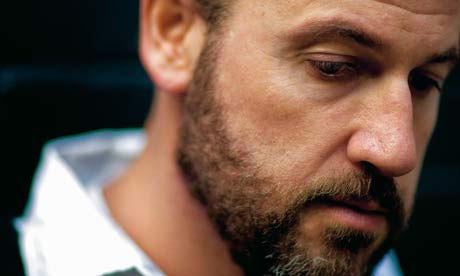This much I know
James Frey, writer, 38, London

American author James Frey now lives in London. Photograph: Antonio Olmos
Since I was 24 or so, my goal has always been to be a great writer,to be one of the most influential, most controversial, most widely read literary figures of my time. The only ambition I have is to write great books or fail absolutely trying.
I’ve been in conflict with everything for my whole life. That’s the rule, not the exception. Conflict with myself over ideas of how to live and think, what to think, what to believe. My wife laughs and says I’m only comfortable when there’s a fight.
I’ve been sober for 15 years, so I’m pretty used to it. There are days I wish I could drink. You drink so you don’t have to feel something, and when you feel something deeply it can be difficult. Every day going through the Oprah scandal [Frey admitted fabricating sections of his memoir A Million Little Pieces on Oprah] I just wanted to make it go away, but if I started drinking or using again I would lose a whole lot else.
A Million Little Pieces is the most investigated book in American history. No other work of literature has been put under the microscope in the way that was – it was shocking.
I don’t believe in God or a higher power. I believe that you shouldn’t be allowed to impose morality on people because a book written several thousand years ago says so. My next book is about a secular Jew in New York who comes to believe he’s the Messiah. It’s my idea of what
the Messiah would be like if he were alive today. It’s a very serious, very heavy book.
During the Oprah stuff I called Brett Easton Ellis and said: ‘Dude, what do I do?’, and he laughed and said: ‘You have so far exceeded any of the messes I made that I can no longer give you advice.’
I don’t have any real interest in drinking in moderation.
I don’t think of Bright Shiny Morning as my starting out as a novelist. I would be naive to think that the past will be forgotten, but I hope it will eventually be seen as part of a larger body of work that explores questions of fact and fiction and do they matter.
I walk down the street in America and I get stopped all the time; I get recognised a lot. I talk to readers on the street, and I’ve never had one say anything bad to me or attack me.
I think the problem is with the genre. Memoir is a corrupt genre – there are no rules, there’s no definition. People want great readable literary experiences, and it can be difficult to provide that and stay focused on perfect factual truth.
I’m definitely more humble now than I have been at other times in my life. I think success can humble you as much as failure, because success is as empty as failure.
That life I lived: people end up dying young. There’s no happy ending to a life of addiction.
If my daughter is going to drink when she’s older, I’m just going to say: ‘Look, Daddy had a lot of problems with it. Be very careful: if you ever have any questions, come talk to me.’ But the idea that my children are going to go through life without ever drinking is incredibly naive and ridiculous. But I don’t sit and worry about things that haven’t happened yet.
My intentions were always literary and artistic. I never intended A Million Little Pieces to be a self-help book – if anything, it was intended to be an insult to the self-help industry, but at some point it became part of it.
If I’m the guy who destroyed the memoir genre, I’m not unhappy about that.
· Bright Shiny Morning is published by John Murray at £12.99
